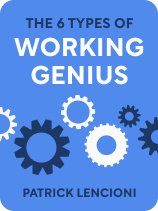

This article is an excerpt from the Shortform book guide to "The 6 Types of Working Genius" by Patrick Lencioni. Shortform has the world's best summaries and analyses of books you should be reading.
Like this article? Sign up for a free trial here.
What are the essential skills needed for the closing phase in project management? Why is it important to be supportive during the final stage?
The final phase of project management involves seeing the project to completion. The team members best suited to this stage are the ones who pay close attention to detail and see things through.
Let’s look at the two type of people that are necessary for this crucial stage.
1. The Supportive Type
The person with the supportive type of intelligence notices when teammates require assistance and jumps in to help them in order to complete the closing phase in project management. In The 6 Types of Working Genius, Patrick Lencioni says that this person often recognizes that their teammates need help before they realize it themselves, making them indispensable to the team during fever-pitched moments. For instance, this person might observe that machinists in your manufacturing department are having trouble applying the specs given to them by engineering and then obtain clarification for them. Or, they could help the marketing department express the benefits of your chosen alloy in laymen’s terms so investors and customers understand and become intrigued.
According to Lencioni, this intelligence is passive because it involves responding to others on the team who need assistance.
(Shortform note: The person with the Supporting intelligence is the quintessential team player, and Lencioni underscores their perceptive abilities in recognizing the needs of others. Beyond just their positive attitude and desire to help, however, team players such as these often have an enhanced ability to balance their own needs for success, well-being, and recognition with those of the group. Moreover, they have special abilities to listen actively, seek out opportunities for compromise, and openly celebrate the success of others. This is an intelligence frequently exhibited by successful team athletes and military veterans.)
2. People Who See Things Through
The person with this intelligence is the taskmaster. She always keeps the end goal in mind, making sure efficiency, timing, and quality are on point. People with this intelligence love to check boxes—they are relentless, nuts-and-bolts thinkers. This is the person who makes sure your new razor blade is ready for that vital sales quarter, that everyone knows the quality and uniqueness of what they’re selling, and that the product itself delivers value, precision, quality, and durability. She’s often focused on late-stage problem-solving, making her territory the least conceptual and most pragmatic stage of work.
This intelligence is active because its personality provides the drive and focus required to see things through. The principal distinction Lencioni describes between this person and someone with Mobilizing intelligence—the person who energizes and motivates the team during the set-up phase of work—is that mobilizing is about inspiring teammates, whereas seeing things through is about doggedly pursuing the goal.
(Shortform note: The person with Seeing Things Through intelligence not only gets your team’s project across the finish line but also helps the team gain larger psychological benefits. Psychological investigation recognizes that human beings thrive when experiencing closure—it allows people to feel safe and secure within environments and relationships. On the other hand, failed projects can lead to disappointment, cognitive stress, and reduced faith in the legitimacy of those processes and others’ promises. Therefore, this intelligence conceivably closes a vital circuit in human expectations.)

———End of Preview———
Like what you just read? Read the rest of the world's best book summary and analysis of Patrick Lencioni's "The 6 Types of Working Genius" at Shortform.
Here's what you'll find in our full The 6 Types of Working Genius summary:
- The six types of working intelligence that successful teams need
- How to identify which traits your team members have
- How to apply the six types of genius to bolster workflow and well-being






